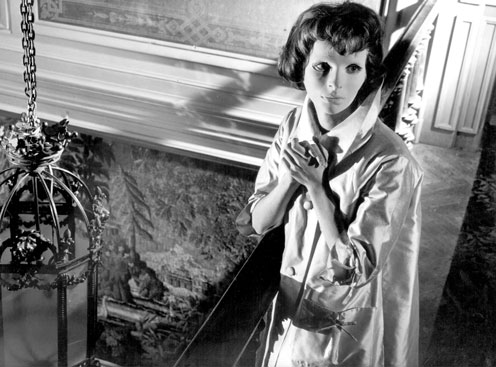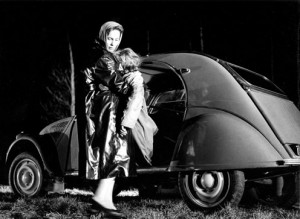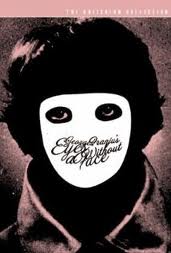Eyes Without a Face/1960/Champs-Élysées Productions/88 min./in French, with English subtitles
I can’t think of many movies that combine Grand Guignol and Givenchy. So I’m grateful for 1959’s “Eyes Without a Face,” which critic Pauline Kael described as: “perhaps the most austerely elegant horror film ever made.”
It plays at 1:30 p.m. Saturday, Nov. 5, at the Egyptian Theatre in Hollywood as part of AFI FEST 2011.
Noir and horror, both rooted in German Expressionism, overlap from time to time – the dramatic compositions, intense interplay of light and shadow, and the examination of the human mind’s most nefarious corners.
Director Georges Franju’s film, based on a Jean Redon novel, invites us into a frightening, yet poetic, world in which guilt has tipped Docteur Génessier (Pierre Brasseur) into a spiral of insanity. Loaded with darkness and visual style, “Eyes” counts in my book as a borderline noir.
The doctor’s daughter Christiane Génessier (Edith Scob) was disfigured in a car accident and lives as a virtual prisoner, hiding behind a tasteful mask and swathed in glimmering Givenchy. Because he was driving the car, the doctor can’t forgive himself. As any devoted and deranged dad would do, he, along with his secretary Louise (Alida Valli), kidnaps young women who resemble poor Christiane, drugs them and attempts to use their faces as replacements. Christiane could then assume a new identity. As you might expect, this is a pretty tall order.
While Louise isn’t quite a femme fatale, she’s still pretty tough. In the opening scene, for instance, we see her singlehandedly dragging a body from a car and dumping it in the river. And she’s always so charming, not to mention impeccably dressed, when she lures new victims, offering them little favors like a place to stay or great seats at the theater.
But the doctor starts to be outnumbered. The police (Alexandre Rignault, Claude Brasseur, Pierre’s son) get curious and so does Christiane’s former fiancé(François Guérin). More importantly, though, Christiane eventually revolts.
“Eyes Without a Face” left its mark on pop culture inspiring, for instance, Billy Idol’s ballad by the same name from the 1984 album “Rebel Yell.” The film also functions as a political parable with Docteur Génessier representing the evils of fascism. His daughter, though at first subdued, finally throws off her shackles, as in the scene where she releases the snarling, caged dogs and walks along with a dove on her wrist.
It is one of many surreal images, recalling perhaps a De Chirico painting of a deserted piazza, beautifully crafted by Franju, set off by Maurice Jarre’s chilling classical-style music.
Despite his talent, Franju (1912-1987) and his films have not been widely appreciated. Having made his mark with documentaries, he later specialized in poetic thrillers, romances and fantasies (“Judex,” “Thérèse Desqueyroux”). He was also a co-founder, with Henri Langlois, in 1936, of the Cinémathèque Française.
Here’s hoping Saturday’s screening will earn Franju a few more fans.













From FNB readers